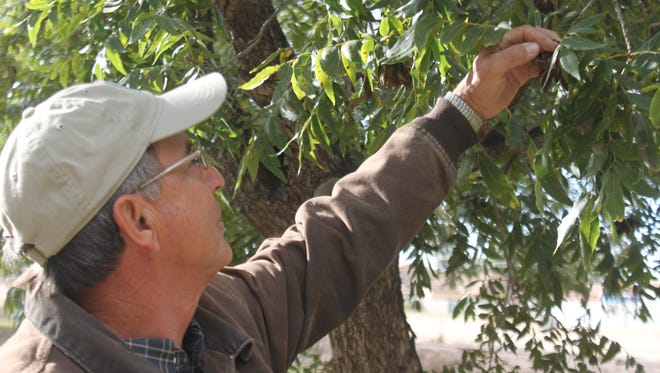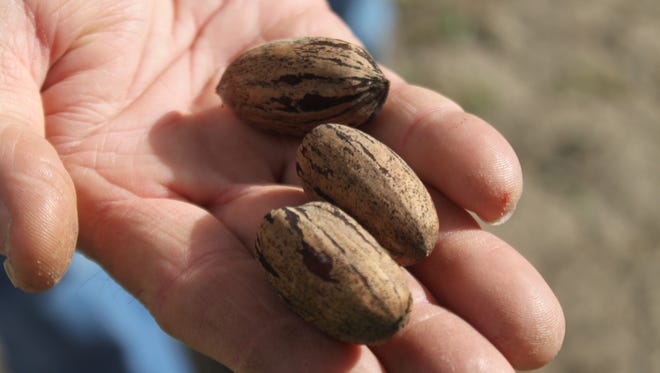Pecan licensing gains support from New Mexico lawmakers
 Adrian Hedden
Adrian Hedden
Licensure could be New Mexico’s latest weapon against the notorious pecan weevil, if legislation is passed to establish a license for pecan buyers that would track where the nuts came from while criminalizing theft.
House Bill 214, known as the Pecan Buyers Licensure Act, would create a state licensing and oversight process for in-shell pecan buyers.
It would set penalties for those who purchase large quantities of the cash crop without a license.
HB 214 passed on the House floor Friday, and was sent to the Senate Conservation Committee.
New Mexico’s pecan industry has struggled recently as the pecan weevil was reported in parts of Eddy, Lea and Chaves counties.
More:Orchard invasion: Pecan weevil threatens to upend New Mexico's $180M industry
Quarantines were issued in recent months, with the latest 180-day restriction going into effect in November to regulate shipments from quarantined areas into areas where the weevil was not discovered.
Shippers must keep track of where the nuts came from, and have proof they are not infested.
The weevil bores into the nut’s outer shell and feeds on the nutmeat inside.
Infested nuts are believed to be unfit for human consumption.
“Every year, New Mexico’s pecan growers have incurred increasingly larger losses at the hand of thieves who raid their pecan groves and then sell their ill-gotten gains to unsuspecting or unscrupulous buyers,” said Rep. Yvette Herrell (R-51).
“By creating a state licensing system, we can help prevent this theft and protect a major driver of New Mexico’s economy."
More:State bills to support pecan weevil eradication efforts
Sen. Cliff Pirtle (R-32), who sponsored the equivalent Senate bill, Senate Bill 217, said licensure could prevent unregulated distribution of the nut, and thus spread of the weevil.
“This is bill is to prevent theft of pecans and it is to prevent the pecan weevil infestation to spread to more pecans,” read a news release from Pirtle’s office.
“By licensing those buying the important nut in New Mexico, the state can better identify nuts that might have been stolen and track where infested nuts came from to help prevent the spread of the nasty pecan weevil.”
Along with the added security for pecan growers and buyers comes an added cost.
The bill, as proposed, includes a provision that allows the state to charge up to $500 annually for licensing.
Carlsbad pecan grower Dean Calvani said it’s all about money.

He said this year, he found a “handful” of pecans presenting pest damage from his 500 acres of orchards.
Calvani have inspectors two different locations where the potentially pest-ridden pecans were grown, and he said no infestation was found in his groves.
The New Mexico Department of Agriculture (NMDA) inspects his crop weekly, Calvani said, and his scales and other equipment must be certified.
His operation is licensed through the City of Carlsbad, Calvani said, and he sees no reason to add regulations.
“It sounds like this is just another way that they can generate that income,” Calvani said. “I agree you should have a city license. If they do find (the weevil) I don’t think they have the money to spray those trees.”
Another Senate bill was introduced during the ongoing legislative session to help pay for eradication efforts.
Senate Bill 160, introduced by Sen. Carroll Leavell (R-41) proposed appropriating $250,000 from the State’s General Fund to the NMDA to help with eradication efforts.
It was last heard on Feb. 1 by Senate Conservation Committee, and was given a "do pass" recommendation.

The bill was last waiting for a hearing in the Senate Finance Committee.
New Mexico Agriculture Secretary Jeff Witte said the money would likely be used for personnel needed in inspection and removal efforts.
“The appropriations would be used to continue our cooperation with industry in an effort to expand current detection and eradication of pecan weevil,” Witte said. “Our current expenditures are directed toward seasonal staff and pest control contractors. Appropriations would also be used for additional support in exporting pecans.”
Brad Lewis, assistant director of entomology and nursery industries said eradication efforts must increase as reports of infestations continue.
“Eradication efforts have been productive, but insufficient for the number of trees we have found to be infested with pecan weevil,” he said.
Adrian Hedden can be reached at 575-628-5516, achedden@currentargus.com or @AdrianHedden on Twitter.